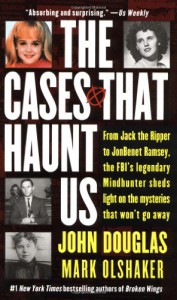chaotic paladin
If you're interested in an obnoxious opinionated lesbian, then I'm the gal for ya! I'm mostly interested in true crime, high/mid/low/urban fantasy, weird fiction, and gothic literature.
The Cases that Haunt Us

I have previously read Douglas' The Anatomy of Motive, and it quickly became one of my favorites, so I simply had to get my hands on more Douglas. The true crime section of bookstores where I live is scant, but I got lucky visiting my grandparents in Texas and found The Cases that Haunt Us in a used bookstore (as well as approximately 15 other true crime books... oops). I brought The Cases that Haunt Us with me while on a trip to Boston, and it kept me company on plane, train, and subway alike. Overall, I would have to say it's a good read, but not Douglas' best work by a long shot.
The book seemed mostly geared towards people who have a more passing interest in true crime. To be clear, I don't consider this a bad thing, but as a result sections of the book read as simplified to me. As someone who is very enthusiastic about the topic, the book was a little disappointing due to this; I wanted some more in-depth detailed analysis, a deeper dive into the evidence and connections.
Many of the cases had evidence or theories that Douglas skipped over (Um, hello Burke Ramsey??), while the older cases (Jack the Ripper and Lizzie Bordon) were a little lackluster when it came to his overview of the crime/s. Of course, that is partially due to the age of the crimes, but there was still evidence that This is contrasted with the newer crimes, however, as the overview of the cases went on for a little too long. Perhaps it is my own personal preferences (as the Lindbergh and JonBenet cases do not interest me) but the case summaries dragged on for far too long.
On the topic of the JonBenet Ramsey case, I honestly feel as though the entire chapter-- and case-- should have been cut from the book. This chapter was both the longest and the worst in the book. Not because it was bad writing, but due to Douglas' personal involvement with the case the chapter read as being somewhat biased (despite Douglas' insistence that his analysis was unbiased). He takes time to explain and defend his own actions and choices. While I appreciate his transparency, the earlier chapters had a draw the JonBenet chapter did not. They were unbiased analysis from an outsider's standpoint. This chapter read mostly as "This is why this guy's opinions on my opinions as to what I said are wrong, obviously, and also here is why I chose to do what I did on this case. Oh also Patsy definitely didn't do it". He also skipped over the theories of Burke's involvement completely, even though if he wanted to dismiss that theory it would be easy enough to do with his expertise. Perhaps it was cut because the chapter was too long, but it's absence weakened the chapter even further.
This book is, overall, one that suffers from a balance issue. What analysis of the offender there is in the chapters is good, and Douglas clearly explains the connections between the crime scene and the offender's behavior. There could be more, though, so some of the explanations tend to be disappointing. For example, the chapter on Zodiac; interesting because of the nature of the case, interesting because of Douglas' analysis of the letters, and interesting because of the strategies to lure him out Douglas discusses, but overall disappointing due to the lack of a really in-depth dive. The chapter on the Zodiac is only 47 pages long. Some of the chapters-- like Zodiac-- are too short, others are, comparatively, too long. The final chapter-- in which Douglas offers an explanation as to why it is these cases that have so strongly entered the public conscious-- is disappointingly brief at only 5 pages, though he makes some good points.
As a true crime writer, Douglas is meh. As a behavioral analysis writer, he's amazing; his issue was that he leaned too heavily on the former rather than the latter for this book. His trademark transparency, respect for everyone involved in the case, and fair criticisms of the media and the handling of cases were present in this book, though, which are all features many true crime writers often miss out on.
I probably wouldn't suggest this book to anyone who already knows quite a bit about these cases; the book is more likely to frustrate you with what it leaves out. However, for someone who is just dipping their toes into the pool of true crime or behavioral analysis, it's a good introduction to some of the cases that haunt us.



